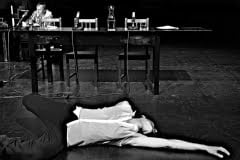
Martina Hefter
- Germany
- Zu Gast beim ilb: 2013
Martina Hefter was born in 1965 in the Ostallgäu region of Bavaria and she now lives as a poet and performing artist in Leipzig.
After releasing three novels, Hefter had her poetry debut. In each of her two volumes of poetry, »Nach den Diskotheken« (2010; tr. After the Discos) and »Vom Gehen und Stehen. Ein Handbuch« (2013; tr. On Walking and Standing. A Handbook), both illustrated by Andreas Töpfer, Hafter explores the relationships between language, bodies, movement, space, sound and consciousness. Writing about Hefter, German daily newspaper, the »Frankfurter Allgemeinen Zeitung« said that she »explores the similarities between body and language, between dancing and thinking, allows the body to think and language to dance and, in speaking about the body, allows a diffuse knowledge – of the world, perhaps – to flare up, only to have it swirl away from us again in the next second«. Suggestions of antiquity adhere to a young girl in a disco and she speculates on mythological analogies while transforming quotidian poses into poetic miniatures in her lyrical »handbook«, oscillating between stasis and restlessness. Her understanding of language and movement as reciprocal enhancements also plays an important role in her poetry. »In contemporary dance, or also in ballet, one always assumes that dancing is a form of thinking, physical thinking. That has always attracted me, those two different ways of thinking: thinking with your brain and thinking with your body«, Hefter said in a interview with German radio station. From this, in turn, performances like the dance piece »Vortrag über Schreiben« (tr. Lecture on Writing) evolved. In 2012 Hefter initiated and led the project »Bewegungsschreiber – Dichtung trifft Tanz« (Movement Writer – Poetry meets Dance) at Dock 11 in Berlin.
Among the recognition for her literary work she has been awarded a scholarship from the Kulturstiftung Sachsen (Saxon Culture Institute), the Lessing Prize research award, the Hermann Lenz Scholarship and the London Scholarship of the Deutscher Literaturfonds. In 2008 she was awarded the Meran Lyrikpreis (Meran Poetry Prize).
Junge Hunde
Alexander Fest
Berlin, 2001
Zurück auf Los
Wallstein
Göttingen, 2005
Die Küsten der Berge
Wallstein
Göttingen, 2008
Nach den Diskotheken
Gedichte
[Ill: Andreas Töpfer]
kookbooks
Berlin, 2010
Vom Gehen und Stehen
Ein Handbuch
[Ill: Andreas Töpfer]
kookbooks
Berlin, 2013
